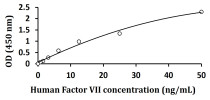ARG83281
Human Factor VII ELISA Kit
Human Factor VII ELISA Kit for ELISA and Human
Overview
| Product Description | ARG83281 Human Factor VII ELISA Kit is an Enzyme Immunoassay kit for the quantification of Human Factor VII in Serum, Plasma and Cell culture supernatants. |
|---|---|
| Tested Reactivity | Hu |
| Tested Application | ELISA |
| Specificity | There is no detectable cross-reactivity with other relevant proteins. |
| Target Name | Factor VII |
| Conjugation | HRP |
| Conjugation Note | Substrate: TMB and read at 450 nm. |
| Sensitivity | 25 pg/ml |
| Detection Range | 0.78 ng/ml - 50 ng/ml |
| Sample Type | Serum, Plasma and Cell culture supernatants |
| Precision | Intra-Assay CV: 6.5% Inter-Assay CV: 5.5% |
| Alternate Names | Eptacog alfa; Coagulation factor VII; SPCA; Serum prothrombin conversion accelerator; EC 3.4.21.21; Proconvertin |
Application Instructions
| Assay Time | ~ 5 hours |
|---|
Properties
| Form | 96 well |
|---|---|
| Storage Instruction | Store the kit at 2-8°C. Keep microplate wells sealed in a dry bag with desiccants. Do not expose test reagents to heat, sun or strong light during storage and usage. Please refer to the product user manual for detail temperatures of the components. |
| Note | For laboratory research only, not for drug, diagnostic or other use. |
Bioinformation
| Database Links | |
|---|---|
| Gene Symbol | F7 |
| Gene Full Name | coagulation factor VII (serum prothrombin conversion accelerator) |
| Background | This gene encodes coagulation factor VII which is a vitamin K-dependent factor essential for hemostasis. This factor circulates in the blood in a zymogen form, and is converted to an active form by either factor IXa, factor Xa, factor XIIa, or thrombin by minor proteolysis. Upon activation of the factor VII, a heavy chain containing a catalytic domain and a light chain containing 2 EGF-like domains are generated, and two chains are held together by a disulfide bond. In the presence of factor III and calcium ions, the activated factor then further activates the coagulation cascade by converting factor IX to factor IXa and/or factor X to factor Xa. Defects in this gene can cause coagulopathy. Alternative splicing results in multiple transcript variants encoding different isoforms that may undergo similar proteolytic processing to generate mature polypeptides. [provided by RefSeq, Aug 2015] |
| Function | Initiates the extrinsic pathway of blood coagulation. Serine protease that circulates in the blood in a zymogen form. Factor VII is converted to factor VIIa by factor Xa, factor XIIa, factor IXa, or thrombin by minor proteolysis. In the presence of tissue factor and calcium ions, factor VIIa then converts factor X to factor Xa by limited proteolysis. Factor VIIa will also convert factor IX to factor IXa in the presence of tissue factor and calcium. [UniProt] |
| Cellular Localization | Secreted. [UniProt] |
| PTM | The vitamin K-dependent, enzymatic carboxylation of some glutamate residues allows the modified protein to bind calcium. The iron and 2-oxoglutarate dependent 3-hydroxylation of aspartate and asparagine is (R) stereospecific within EGF domains. O- and N-glycosylated. N-glycosylation at Asn-205 occurs cotranslationally and is mediated by STT3A-containing complexes, while glycosylation at Asn-382 is post-translational and is mediated STT3B-containing complexes before folding. O-fucosylated by POFUT1 on a conserved serine or threonine residue found in the consensus sequence C2-X(4,5)-[S/T]-C3 of EGF domains, where C2 and C3 are the second and third conserved cysteines. Can be either O-glucosylated or O-xylosylated at Ser-112 by POGLUT1 in vitro. [UniProt] |
Images (1) Click the Picture to Zoom In
| Title | Download Link |
|---|---|
| ARG83281 Human Factor VII ELISA Kit User manual |
 Download Download
|






